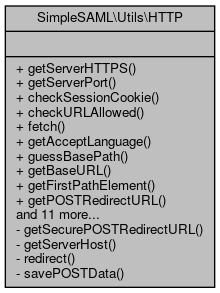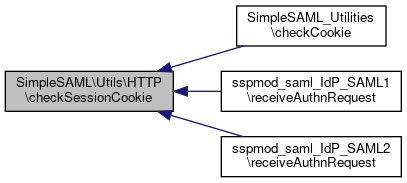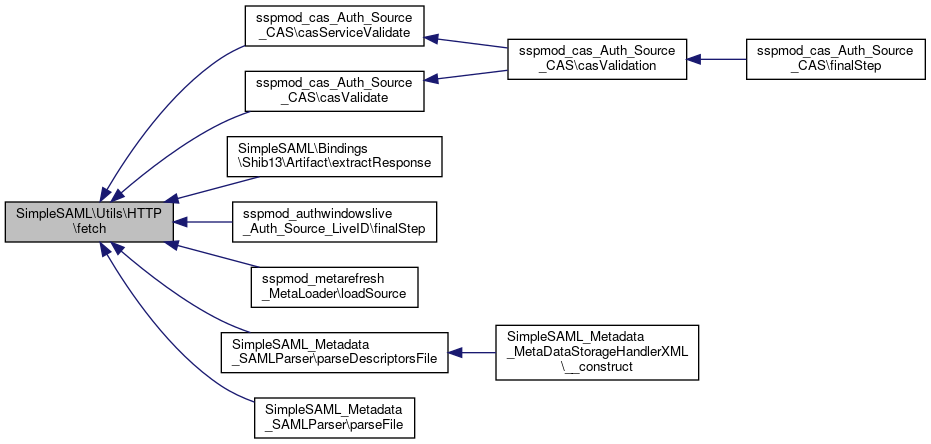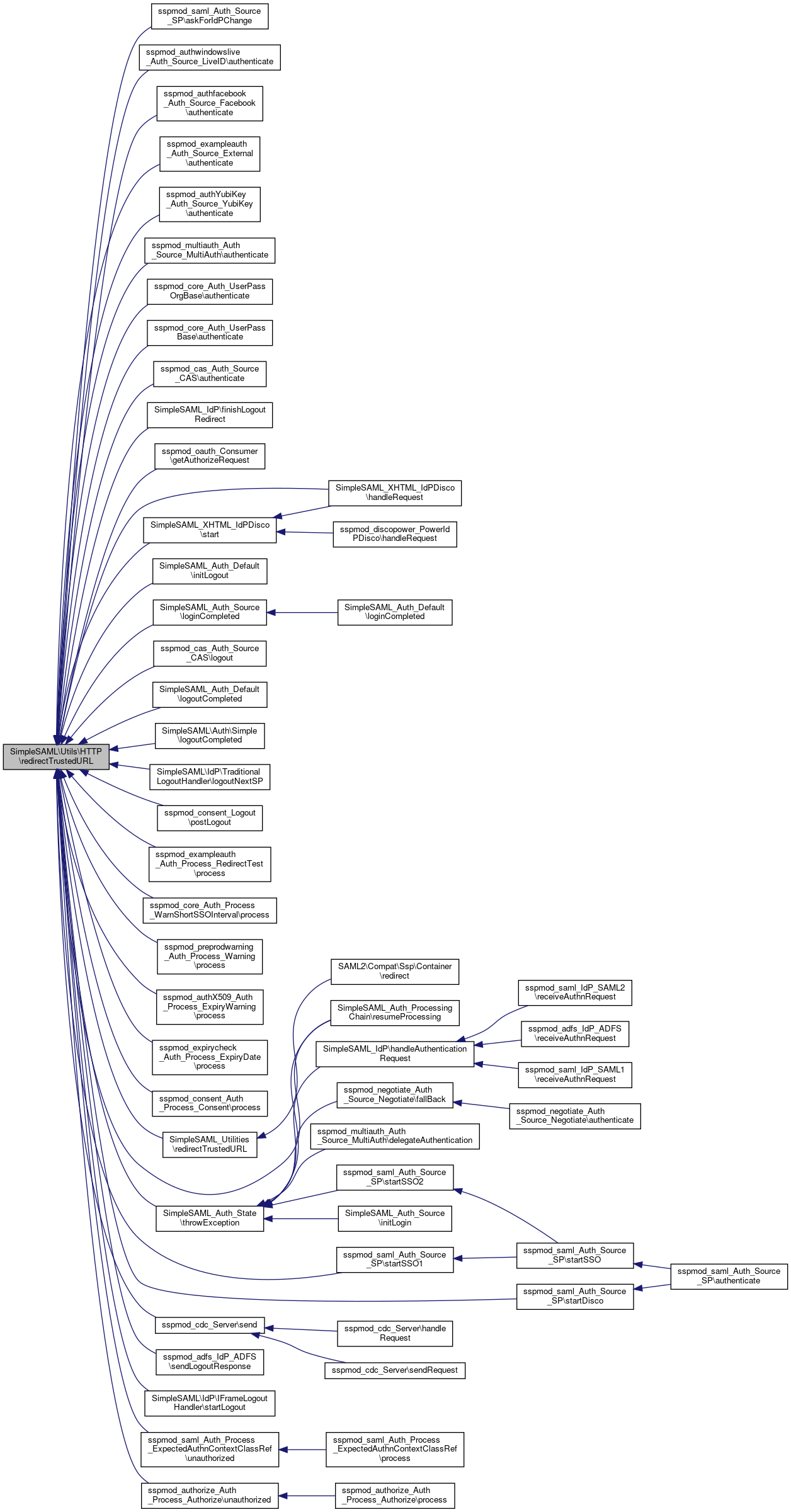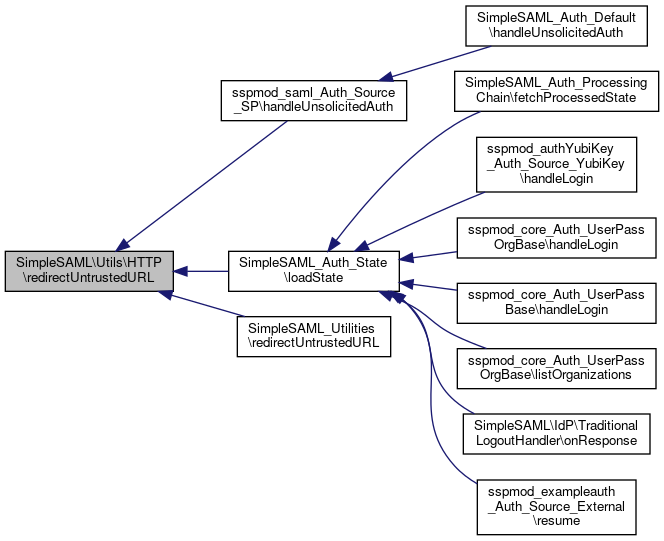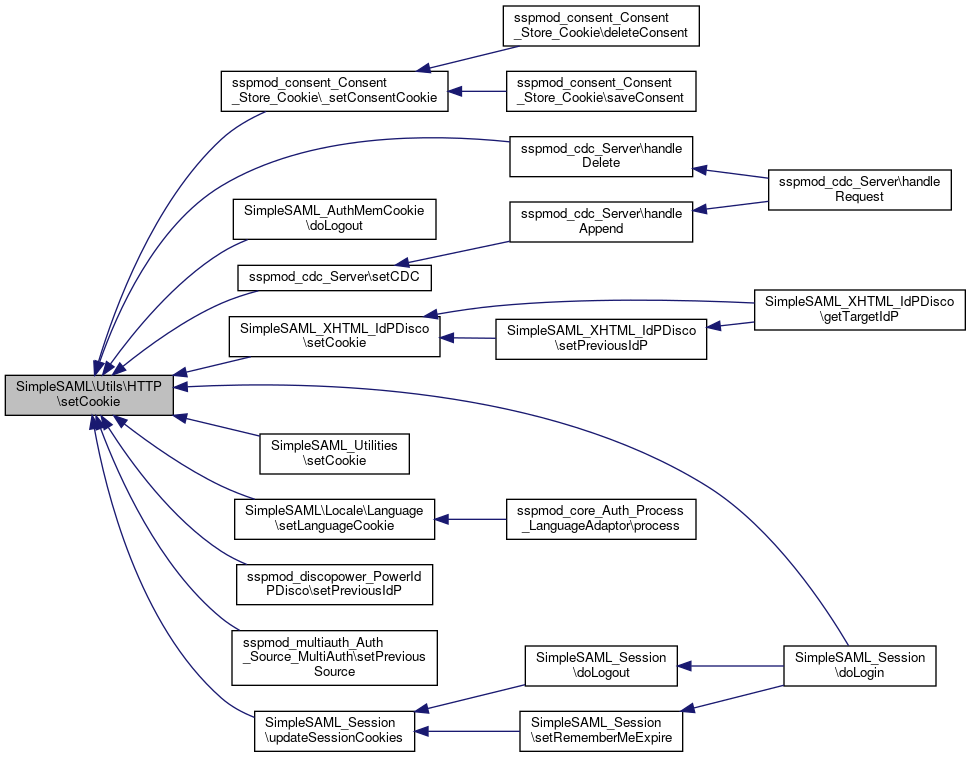 Collaboration diagram for SimpleSAML\Utils\HTTP:
Collaboration diagram for SimpleSAML\Utils\HTTP:Static Public Member Functions | |
| static | getServerHTTPS () |
| Retrieve HTTPS status from $_SERVER environment variables. More... | |
| static | getServerPort () |
| Retrieve the port number from $_SERVER environment variables. More... | |
| static | checkSessionCookie ($retryURL=null) |
| Check for session cookie, and show missing-cookie page if it is missing. More... | |
| static | checkURLAllowed ($url, array $trustedSites=null) |
| Check if a URL is valid and is in our list of allowed URLs. More... | |
| static | fetch ($url, $context=array(), $getHeaders=false) |
| Helper function to retrieve a file or URL with proxy support, also supporting proxy basic authorization. More... | |
| static | getAcceptLanguage () |
| This function parses the Accept-Language HTTP header and returns an associative array with each language and the score for that language. More... | |
| static | guessBasePath () |
| Try to guess the base SimpleSAMLphp path from the current request. More... | |
| static | getBaseURL () |
| Retrieve the base URL of the SimpleSAMLphp installation. More... | |
| static | getFirstPathElement ($trailingslash=true) |
| Retrieve the first element of the URL path. More... | |
| static | getPOSTRedirectURL ($destination, $data) |
| Create a link which will POST data. More... | |
| static | getSelfHost () |
| Retrieve our own host. More... | |
| static | getSelfHostWithPath () |
| Retrieve our own host together with the URL path. More... | |
| static | getSelfURLNoQuery () |
| Retrieve the current URL using the base URL in the configuration, without the query parameters. More... | |
| static | isHTTPS () |
| This function checks if we are using HTTPS as protocol. More... | |
| static | normalizeURL ($url) |
| Normalizes a URL to an absolute URL and validate it. More... | |
| static | parseQueryString ($query_string) |
| Parse a query string into an array. More... | |
| static | redirectTrustedURL ($url, $parameters=array()) |
| This function redirects to the specified URL without performing any security checks. More... | |
| static | redirectUntrustedURL ($url, $parameters=array()) |
| This function redirects to the specified URL after performing the appropriate security checks on it. More... | |
| static | resolveURL ($url, $base=null) |
| Resolve a (possibly relative) URL relative to a given base URL. More... | |
| static | setCookie ($name, $value, $params=null, $throw=true) |
| Set a cookie. More... | |
| static | submitPOSTData ($destination, $data) |
| Submit a POST form to a specific destination. More... | |
Static Private Member Functions | |
| static | getSecurePOSTRedirectURL ($destination, $data) |
| Obtain a URL where we can redirect to securely post a form with the given data to a specific destination. More... | |
| static | getServerHost () |
| Retrieve Host value from $_SERVER environment variables. More... | |
| static | redirect ($url, $parameters=array()) |
| This function redirects the user to the specified address. More... | |
| static | savePOSTData (\SimpleSAML_Session $session, $destination, $data) |
| Save the given HTTP POST data and the destination where it should be posted to a given session. More... | |
Detailed Description
Member Function Documentation
◆ checkSessionCookie()
|
static |
Check for session cookie, and show missing-cookie page if it is missing.
- Parameters
-
string | null $retryURL The URL the user should access to retry the operation. Defaults to null.
- Returns
- void If there is a session cookie, nothing will be returned. Otherwise, the user will be redirected to a page telling about the missing cookie.
- Exceptions
-
InvalidArgumentException If $retryURL is neither a string nor null.
Definition at line 287 of file HTTP.php.
Referenced by SimpleSAML_Utilities\checkCookie(), sspmod_saml_IdP_SAML1\receiveAuthnRequest(), and sspmod_saml_IdP_SAML2\receiveAuthnRequest().
 Here is the caller graph for this function:
Here is the caller graph for this function:◆ checkURLAllowed()
|
static |
Check if a URL is valid and is in our list of allowed URLs.
- Parameters
-
string $url The URL to check. array $trustedSites An optional white list of domains. If none specified, the 'trusted.url.domains' configuration directive will be used.
- Returns
- string The normalized URL itself if it is allowed. An empty string if the $url parameter is empty as defined by the empty() function.
- Exceptions
-
InvalidArgumentException If the URL is malformed.
- Exceptions
-
SimpleSAML_Error_Exception If the URL is not allowed by configuration.
Definition at line 322 of file HTTP.php.
Referenced by SimpleSAML_XHTML_IdPDisco\__construct().
 Here is the caller graph for this function:
Here is the caller graph for this function:◆ fetch()
|
static |
Helper function to retrieve a file or URL with proxy support, also supporting proxy basic authorization.
An exception will be thrown if we are unable to retrieve the data.
- Parameters
-
string $url The path or URL we should fetch. array $context Extra context options. This parameter is optional. boolean $getHeaders Whether to also return response headers. Optional.
- Returns
- string|array An array if $getHeaders is set, containing the data and the headers respectively; string otherwise.
- Exceptions
-
InvalidArgumentException If the input parameters are invalid.
- Exceptions
-
SimpleSAML_Error_Exception If the file or URL cannot be retrieved.
Definition at line 409 of file HTTP.php.
Referenced by sspmod_cas_Auth_Source_CAS\casServiceValidate(), sspmod_cas_Auth_Source_CAS\casValidate(), sspmod_authwindowslive_Auth_Source_LiveID\finalStep(), sspmod_metarefresh_MetaLoader\loadSource(), SimpleSAML_Metadata_SAMLParser\parseDescriptorsFile(), and SimpleSAML_Metadata_SAMLParser\parseFile().
 Here is the caller graph for this function:
Here is the caller graph for this function:◆ getAcceptLanguage()
|
static |
This function parses the Accept-Language HTTP header and returns an associative array with each language and the score for that language.
If a language includes a region, then the result will include both the language with the region and the language without the region.
The returned array will be in the same order as the input.
- Returns
- array An associative array with each language and the score for that language.
Definition at line 499 of file HTTP.php.
Referenced by SimpleSAML\Locale\Language\getHTTPLanguage().
 Here is the caller graph for this function:
Here is the caller graph for this function:◆ getBaseURL()
|
static |
Retrieve the base URL of the SimpleSAMLphp installation.
The URL will always end with a '/'. For example: https://idp.example.org/simplesaml/
- Returns
- string The absolute base URL for the SimpleSAMLphp installation.
- Exceptions
-
SimpleSAML\Error\CriticalConfigurationError If 'baseurlpath' has an invalid format.
Definition at line 598 of file HTTP.php.
Referenced by SimpleSAML_Metadata_MetaDataStorageHandlerFlatFile\generateDynamicHostedEntityID(), SimpleSAML_Metadata_MetaDataStorageHandlerPdo\generateDynamicHostedEntityID(), and SimpleSAML_Error_Error\show().
 Here is the caller graph for this function:
Here is the caller graph for this function:◆ getFirstPathElement()
|
static |
Retrieve the first element of the URL path.
- Parameters
-
boolean $trailingslash Whether to add a trailing slash to the element or not. Defaults to true.
- Returns
- string The first element of the URL path, with an optional, trailing slash.
Definition at line 647 of file HTTP.php.
◆ getPOSTRedirectURL()
|
static |
Create a link which will POST data.
- Parameters
-
string $destination The destination URL. array $data The name-value pairs which will be posted to the destination.
- Returns
- string A URL which can be accessed to post the data.
- Exceptions
-
InvalidArgumentException If $destination is not a string or $data is not an array.
Definition at line 668 of file HTTP.php.
Referenced by SimpleSAML\Auth\Simple\login().
 Here is the caller graph for this function:
Here is the caller graph for this function:◆ getSecurePOSTRedirectURL()
|
staticprivate |
Obtain a URL where we can redirect to securely post a form with the given data to a specific destination.
- Parameters
-
string $destination The destination URL. array $data An associative array containing the data to be posted to $destination.
- Exceptions
-
SimpleSAML_Error_Exception If the current session is transient.
- Returns
- string A URL which allows to securely post a form to $destination.
Definition at line 26 of file HTTP.php.
References $data, $destination, $id, $info, $session, $url, SimpleSAML\Utils\Crypto\aesEncrypt(), SimpleSAML\Module\getModuleURL(), SimpleSAML_Session\getSessionFromRequest(), and SimpleSAML\Utils\HTTP\savePOSTData().
 Here is the call graph for this function:
Here is the call graph for this function:◆ getSelfHost()
|
static |
Retrieve our own host.
E.g. www.example.com
- Returns
- string The current host.
Definition at line 699 of file HTTP.php.
Referenced by SimpleSAML_Metadata_MetaDataStorageHandler\getMetaDataCurrentEntityID(), SimpleSAML\Auth\Simple\getProcessedURL(), and SimpleSAML_Metadata_MetaDataStorageSource\lookupIndexFromEntityId().
 Here is the caller graph for this function:
Here is the caller graph for this function:◆ getSelfHostWithPath()
|
static |
Retrieve our own host together with the URL path.
Please note this function will return the base URL for the current SP, as defined in the global configuration.
- Returns
- string The current host (with non-default ports included) plus the URL path.
Definition at line 738 of file HTTP.php.
Referenced by SimpleSAML_Metadata_MetaDataStorageHandler\getMetaDataCurrentEntityID().
 Here is the caller graph for this function:
Here is the caller graph for this function:◆ getSelfURLNoQuery()
|
static |
Retrieve the current URL using the base URL in the configuration, without the query parameters.
- Returns
- string The current URL, not including query parameters.
Definition at line 846 of file HTTP.php.
Referenced by sspmod_saml_Message\processAssertion(), and sspmod_saml_Message\processResponse().
 Here is the caller graph for this function:
Here is the caller graph for this function:◆ getServerHost()
|
staticprivate |
Retrieve Host value from $_SERVER environment variables.
- Returns
- string The current host name, including the port if needed. It will use localhost when unable to determine the current host.
Definition at line 54 of file HTTP.php.
◆ getServerHTTPS()
|
static |
Retrieve HTTPS status from $_SERVER environment variables.
- Returns
- boolean True if the request was performed through HTTPS, false otherwise.
Definition at line 84 of file HTTP.php.
References $_SERVER.
Referenced by SimpleSAML\Auth\Simple\getProcessedURL().
 Here is the caller graph for this function:
Here is the caller graph for this function:◆ getServerPort()
|
static |
Retrieve the port number from $_SERVER environment variables.
- Returns
- string The port number prepended by a colon, if it is different than the default port for the protocol (80 for HTTP, 443 for HTTPS), or an empty string otherwise.
Definition at line 109 of file HTTP.php.
References $_SERVER.
Referenced by SimpleSAML\Auth\Simple\getProcessedURL().
 Here is the caller graph for this function:
Here is the caller graph for this function:◆ guessBasePath()
|
static |
Try to guess the base SimpleSAMLphp path from the current request.
This method offers just a guess, so don't rely on it.
- Returns
- string The guessed base path that should correspond to the root installation of SimpleSAMLphp.
Definition at line 563 of file HTTP.php.
Referenced by SimpleSAML\Error\CriticalConfigurationError\__construct().
 Here is the caller graph for this function:
Here is the caller graph for this function:◆ isHTTPS()
|
static |
◆ normalizeURL()
|
static |
Normalizes a URL to an absolute URL and validate it.
In addition to resolving the URL, this function makes sure that it is a link to an http or https site.
- Parameters
-
string $url The relative URL.
- Returns
- string An absolute URL for the given relative URL.
- Exceptions
-
InvalidArgumentException If $url is not a string or a valid URL.
Definition at line 883 of file HTTP.php.
◆ parseQueryString()
|
static |
Parse a query string into an array.
This function parses a query string into an array, similar to the way the builtin 'parse_str' works, except it doesn't handle arrays, and it doesn't do "magic quotes".
Query parameters without values will be set to an empty string.
- Parameters
-
string $query_string The query string which should be parsed.
- Returns
- array The query string as an associative array.
- Exceptions
-
InvalidArgumentException If $query_string is not a string.
Definition at line 915 of file HTTP.php.
◆ redirect()
|
staticprivate |
This function redirects the user to the specified address.
This function will use the "HTTP 303 See Other" redirection if the current request used the POST method and the HTTP version is 1.1. Otherwise, a "HTTP 302 Found" redirection will be used.
The function will also generate a simple web page with a clickable link to the target page.
- Parameters
-
string $url The URL we should redirect to. This URL may include query parameters. If this URL is a relative URL (starting with '/'), then it will be turned into an absolute URL by prefixing it with the absolute URL to the root of the website. string[] $parameters An array with extra query string parameters which should be appended to the URL. The name of the parameter is the array index. The value of the parameter is the value stored in the index. Both the name and the value will be urlencoded. If the value is NULL, then the parameter will be encoded as just the name, without a value.
- Returns
- void This function never returns.
- Exceptions
-
InvalidArgumentException If $url is not a string or is empty, or $parameters is not an array.
Definition at line 148 of file HTTP.php.
References $_SERVER, $code, $url, and SimpleSAML\Logger\warning().
 Here is the call graph for this function:
Here is the call graph for this function:◆ redirectTrustedURL()
|
static |
This function redirects to the specified URL without performing any security checks.
Please, do NOT use this function with user supplied URLs.
This function will use the "HTTP 303 See Other" redirection if the current request used the POST method and the HTTP version is 1.1. Otherwise, a "HTTP 302 Found" redirection will be used.
The function will also generate a simple web page with a clickable link to the target URL.
- Parameters
-
string $url The URL we should redirect to. This URL may include query parameters. If this URL is a relative URL (starting with '/'), then it will be turned into an absolute URL by prefixing it with the absolute URL to the root of the website. string[] $parameters An array with extra query string parameters which should be appended to the URL. The name of the parameter is the array index. The value of the parameter is the value stored in the index. Both the name and the value will be urlencoded. If the value is NULL, then the parameter will be encoded as just the name, without a value.
- Returns
- void This function never returns.
- Exceptions
-
InvalidArgumentException If $url is not a string or $parameters is not an array.
Definition at line 962 of file HTTP.php.
Referenced by sspmod_saml_Auth_Source_SP\askForIdPChange(), sspmod_authfacebook_Auth_Source_Facebook\authenticate(), sspmod_authwindowslive_Auth_Source_LiveID\authenticate(), sspmod_authYubiKey_Auth_Source_YubiKey\authenticate(), sspmod_cas_Auth_Source_CAS\authenticate(), sspmod_core_Auth_UserPassBase\authenticate(), sspmod_core_Auth_UserPassOrgBase\authenticate(), sspmod_exampleauth_Auth_Source_External\authenticate(), sspmod_multiauth_Auth_Source_MultiAuth\authenticate(), SimpleSAML_IdP\finishLogoutRedirect(), sspmod_oauth_Consumer\getAuthorizeRequest(), SimpleSAML_XHTML_IdPDisco\handleRequest(), SimpleSAML_Auth_Default\initLogout(), SimpleSAML_Auth_Source\loginCompleted(), sspmod_cas_Auth_Source_CAS\logout(), SimpleSAML_Auth_Default\logoutCompleted(), SimpleSAML\Auth\Simple\logoutCompleted(), SimpleSAML\IdP\TraditionalLogoutHandler\logoutNextSP(), sspmod_consent_Logout\postLogout(), sspmod_authX509_Auth_Process_ExpiryWarning\process(), sspmod_consent_Auth_Process_Consent\process(), sspmod_core_Auth_Process_WarnShortSSOInterval\process(), sspmod_exampleauth_Auth_Process_RedirectTest\process(), sspmod_expirycheck_Auth_Process_ExpiryDate\process(), sspmod_preprodwarning_Auth_Process_Warning\process(), SimpleSAML_Utilities\redirectTrustedURL(), SimpleSAML_Auth_ProcessingChain\resumeProcessing(), sspmod_cdc_Server\send(), sspmod_adfs_IdP_ADFS\sendLogoutResponse(), SimpleSAML_XHTML_IdPDisco\start(), sspmod_saml_Auth_Source_SP\startDisco(), SimpleSAML\IdP\IFrameLogoutHandler\startLogout(), sspmod_saml_Auth_Source_SP\startSSO1(), SimpleSAML_Auth_State\throwException(), sspmod_authorize_Auth_Process_Authorize\unauthorized(), and sspmod_saml_Auth_Process_ExpectedAuthnContextClassRef\unauthorized().
 Here is the caller graph for this function:
Here is the caller graph for this function:◆ redirectUntrustedURL()
|
static |
This function redirects to the specified URL after performing the appropriate security checks on it.
Particularly, it will make sure that the provided URL is allowed by the 'redirect.trustedsites' directive in the configuration.
If the aforementioned option is not set or the URL does correspond to a trusted site, it performs a redirection to it. If the site is not trusted, an exception will be thrown.
- Parameters
-
string $url The URL we should redirect to. This URL may include query parameters. If this URL is a relative URL (starting with '/'), then it will be turned into an absolute URL by prefixing it with the absolute URL to the root of the website. string[] $parameters An array with extra query string parameters which should be appended to the URL. The name of the parameter is the array index. The value of the parameter is the value stored in the index. Both the name and the value will be urlencoded. If the value is NULL, then the parameter will be encoded as just the name, without a value.
- Returns
- void This function never returns.
- Exceptions
-
InvalidArgumentException If $url is not a string or $parameters is not an array.
Definition at line 994 of file HTTP.php.
Referenced by sspmod_saml_Auth_Source_SP\handleUnsolicitedAuth(), SimpleSAML_Auth_State\loadState(), and SimpleSAML_Utilities\redirectUntrustedURL().
 Here is the caller graph for this function:
Here is the caller graph for this function:◆ resolveURL()
|
static |
Resolve a (possibly relative) URL relative to a given base URL.
This function supports these forms of relative URLs:
- ^\w+: Absolute URL. E.g. "http://www.example.com:port/path?query#fragment".
- ^// Same protocol. E.g. "//www.example.com:port/path?query#fragment"
- ^/ Same protocol and host. E.g. "/path?query#fragment".
- ^? Same protocol, host and path, replace query string & fragment. E.g. "?query#fragment".
- ^# Same protocol, host, path and query, replace fragment. E.g. "#fragment".
- The rest: Relative to the base path.
- Parameters
-
string $url The relative URL. string $base The base URL. Defaults to the base URL of this installation of SimpleSAMLphp.
- Returns
- string An absolute URL for the given relative URL.
- Exceptions
-
InvalidArgumentException If the base URL cannot be parsed into a valid URL, or the given parameters are not strings.
Definition at line 1026 of file HTTP.php.
Referenced by showEntry().
 Here is the caller graph for this function:
Here is the caller graph for this function:◆ savePOSTData()
|
staticprivate |
Save the given HTTP POST data and the destination where it should be posted to a given session.
- Parameters
-
\SimpleSAML_Session $session The session where to temporarily store the data. string $destination The destination URL where the form should be posted. array $data An associative array with the data to be posted to $destination.
- Returns
- string A random identifier that can be used to retrieve the data from the current session.
Definition at line 218 of file HTTP.php.
Referenced by SimpleSAML\Utils\HTTP\getSecurePOSTRedirectURL().
 Here is the caller graph for this function:
Here is the caller graph for this function:◆ setCookie()
|
static |
Set a cookie.
- Parameters
-
string $name The name of the cookie. string | NULL $value The value of the cookie. Set to NULL to delete the cookie. array | NULL $params Cookie parameters. bool $throw Whether to throw exception if setcookie() fails.
- Exceptions
-
InvalidArgumentException If any parameter has an incorrect type.
- Exceptions
-
SimpleSAML\Error\CannotSetCookie If the headers were already sent and the cookie cannot be set.
- Returns
- void
Definition at line 1107 of file HTTP.php.
Referenced by sspmod_consent_Consent_Store_Cookie\_setConsentCookie(), SimpleSAML_Session\doLogin(), SimpleSAML_AuthMemCookie\doLogout(), sspmod_cdc_Server\handleDelete(), sspmod_cdc_Server\setCDC(), SimpleSAML_XHTML_IdPDisco\setCookie(), SimpleSAML_Utilities\setCookie(), SimpleSAML\Locale\Language\setLanguageCookie(), sspmod_discopower_PowerIdPDisco\setPreviousIdP(), sspmod_multiauth_Auth_Source_MultiAuth\setPreviousSource(), and SimpleSAML_Session\updateSessionCookies().
 Here is the caller graph for this function:
Here is the caller graph for this function:◆ submitPOSTData()
|
static |
Submit a POST form to a specific destination.
This function never returns.
- Parameters
-
string $destination The destination URL. array $data An associative array with the data to be posted to $destination.
- Exceptions
-
InvalidArgumentException If $destination is not a string or $data is not an array.
- Returns
- void
Definition at line 1205 of file HTTP.php.
Referenced by SimpleSAML_Utilities\postRedirect(), sspmod_cdc_Server\send(), and SimpleSAML\Bindings\Shib13\HTTPPost\sendResponse().
 Here is the caller graph for this function:
Here is the caller graph for this function:The documentation for this class was generated from the following file:
- libs/composer/vendor/simplesamlphp/simplesamlphp/lib/SimpleSAML/Utils/HTTP.php
